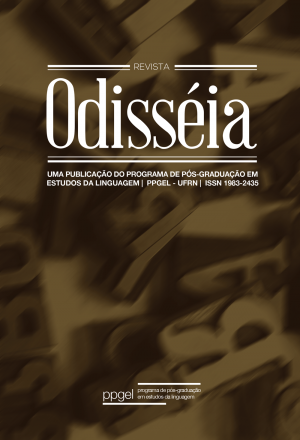GOOD ADVICE IS RARER THAN RUBIES: A LINGUISTIC ANALYSIS OF SALMAN RUSHDIE’S LITTÉRATURE ENGAGÉE
Odisseia
GOOD ADVICE IS RARER THAN RUBIES: A LINGUISTIC ANALYSIS OF SALMAN RUSHDIE’S LITTÉRATURE ENGAGÉE
Autor Correspondente: Luiz A. C. Andrade | [email protected]
Palavras-chave: avaliação atitudinal, compromisso social, literatura
Resumos Cadastrados
Resumo Português:
Este trabalho objetiva lançar o olhar para o construto semântico que subjaz às escolhas linguísticas realizadas no conto de Salman Rushdie - Good Advice is Rarer than Rubies - buscando compreender o engajamento do autor com as personagens e questões sociais trazidas pelo texto de discriminação de gênero, política e econômica na cultura indiana e oriental impostas pelas forças ocidentais, desafiando o leitor a se posicionar em relação às mesmas. Tal engajamento encontra ressonância na literatura de Sartre (1966) para o qual escrever é se comprometer com a liberdade, com o tempo presente e as questões sociais do momento, a partir do engajamento do autor e, principalmente, do leitor como construtor dos significados. O estudo ancora-se nas bases da Gramática Sistêmico-Funcional (GSF) (Halliday, 2014) e na teoria da Avaliatividade de Martin e White (2005) para trazer à superfície aspectos atitudinais dos personagens, como afeto, julgamento e apreciação, expressos nos processos mentais e verbais que tecem o conto.
Resumo Inglês:
This work aims to look into the semantic construct underlying Rushdie’s linguistic choices in the short story “Good Advice is Rarer than Rubies”, in order to unveil the writer’s commitment to the characters and the social issues brought up in the text regarding the gender, political and economic discrimination by the Western powers against both the Indian culture, in particular, and the East. Challenging the reader to take a stance on the matter, the writer’s engagement echoes Sartre’s literature (1966) to whom writing is to be committed, writer and reader – the latter being the constructor of meaning – to freedom, the present time, and social affairs. The study draws on Halliday’s (2014) Systemic-Functional Grammar (SFG) and Martin and White’s (2005) Appraisal Theory to surface the characters’ attitudinal aspects of affect, judgement, and appreciation, expressed in the mental and verbal processes that make up the story.

